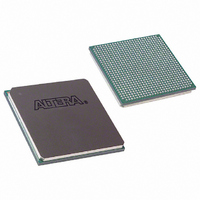EP1S10F780I6N Altera, EP1S10F780I6N Datasheet - Page 588

EP1S10F780I6N
Manufacturer Part Number
EP1S10F780I6N
Description
IC STRATIX FPGA 10K LE 780-FBGA
Manufacturer
Altera
Series
Stratix®r
Datasheet
1.EP1S10F484I6N.pdf
(864 pages)
Specifications of EP1S10F780I6N
Number Of Logic Elements/cells
10570
Number Of Labs/clbs
1057
Total Ram Bits
920448
Number Of I /o
426
Voltage - Supply
1.425 V ~ 1.575 V
Mounting Type
Surface Mount
Operating Temperature
0°C ~ 85°C
Package / Case
780-FBGA
Lead Free Status / RoHS Status
Lead free / RoHS Compliant
Number Of Gates
-
Available stocks
Company
Part Number
Manufacturer
Quantity
Price
Company:
Part Number:
EP1S10F780I6N
Manufacturer:
ALTERA
Quantity:
3 000
- Current page: 588 of 864
- Download datasheet (11Mb)
Finite Impulse Response (FIR) Filters
7–10
Stratix Device Handbook, Volume 2
f
When the coefficients are loaded in parallel, they can be fed directly from
memory elements or any other muxing scheme. This facilitates the
implementation of an adaptive (variable) filter.
Further, if the user wants to implement the shift register chains external
to the DSP block, this can be done by using the altshift_taps
megafunction. In this case, the coefficient and data shifting is done
external to the DSP block. The DSP block is only used to implement the
multiplications and the additions.
Parallel vs. Serial Implementation
The fastest implementations are fully parallel, but consume more logic
resources than serial implementations. To trade-off performance for logic
resources, implement a serial scheme with a specified number of taps. To
facilitate this, Altera provides the FIR Compiler core through its
MegaCore program. The FIR Compiler is an easy-to-use, fully-integrated
graphical user interface (GUI) based FIR filter design software.
For more information on the FIR Compiler MegaCore, visit the Altera
web site at www.altera.com and search for “FIR compiler” in the
“Intellectual Property” page.
It is important to note that the four-multipliers adder mode allows a DSP
block to be configured for parallel or serial input. When it is configured
for parallel input, as shown in
coefficients can be loaded directly without the need for shiftin/shiftout
chains between adjacent registers in the DSP block. When the DSP block
is configured for serial input, as shown in
chains create a register cascade both within the DSP block and also
between adjacent DSP blocks.
Figure
7–6, the data input and the
Figure
7–5, the shiftin/shiftout
Altera Corporation
September 2004
Related parts for EP1S10F780I6N
Image
Part Number
Description
Manufacturer
Datasheet
Request
R

Part Number:
Description:
CYCLONE II STARTER KIT EP2C20N
Manufacturer:
Altera
Datasheet:

Part Number:
Description:
CPLD, EP610 Family, ECMOS Process, 300 Gates, 16 Macro Cells, 16 Reg., 16 User I/Os, 5V Supply, 35 Speed Grade, 24DIP
Manufacturer:
Altera Corporation
Datasheet:

Part Number:
Description:
CPLD, EP610 Family, ECMOS Process, 300 Gates, 16 Macro Cells, 16 Reg., 16 User I/Os, 5V Supply, 15 Speed Grade, 24DIP
Manufacturer:
Altera Corporation
Datasheet:

Part Number:
Description:
Manufacturer:
Altera Corporation
Datasheet:

Part Number:
Description:
CPLD, EP610 Family, ECMOS Process, 300 Gates, 16 Macro Cells, 16 Reg., 16 User I/Os, 5V Supply, 30 Speed Grade, 24DIP
Manufacturer:
Altera Corporation
Datasheet:

Part Number:
Description:
High-performance, low-power erasable programmable logic devices with 8 macrocells, 10ns
Manufacturer:
Altera Corporation
Datasheet:

Part Number:
Description:
High-performance, low-power erasable programmable logic devices with 8 macrocells, 7ns
Manufacturer:
Altera Corporation
Datasheet:

Part Number:
Description:
Classic EPLD
Manufacturer:
Altera Corporation
Datasheet:

Part Number:
Description:
High-performance, low-power erasable programmable logic devices with 8 macrocells, 10ns
Manufacturer:
Altera Corporation
Datasheet:

Part Number:
Description:
Manufacturer:
Altera Corporation
Datasheet:

Part Number:
Description:
Manufacturer:
Altera Corporation
Datasheet:

Part Number:
Description:
Manufacturer:
Altera Corporation
Datasheet:

Part Number:
Description:
CPLD, EP610 Family, ECMOS Process, 300 Gates, 16 Macro Cells, 16 Reg., 16 User I/Os, 5V Supply, 25 Speed Grade, 24DIP
Manufacturer:
Altera Corporation
Datasheet:












